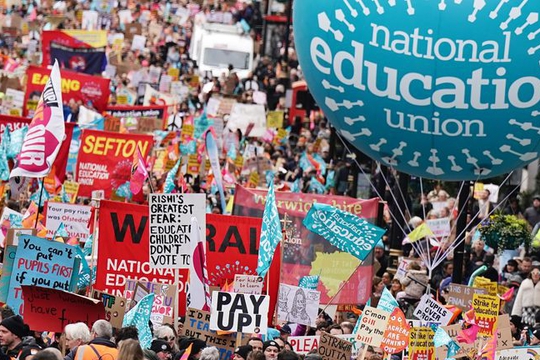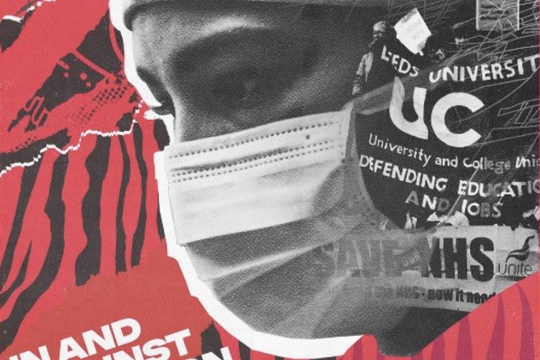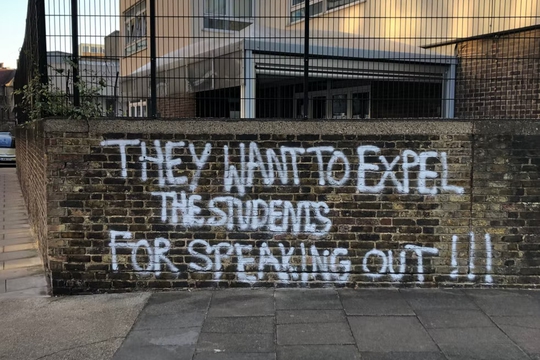The NEU strike - Winning a rank-and-file led union
by
Vik Chechi-Ribeiro
April 28, 2023
Featured in In and Against the Union (#17)
On the opportunities to rebuild a rank-and-file in the education sector.

inquiry
The NEU strike - Winning a rank-and-file led union
by
Vik Chechi-Ribeiro
/
April 28, 2023
in
In and Against the Union
(#17)
On the opportunities to rebuild a rank-and-file in the education sector.
Introduction
On January 15th the National Education Union (NEU) announced strike action over the government’s unfunded and below inflation pay rise. This is by far the largest group of workers to take strike action this strike wave, joining nurses, railway workers, posties, university staff and others in an increasingly widening trade union led struggle over public services during the cost of living crisis.
Workers across 20,000 workplaces withdrawing their labour and causing significant disruption to the capitalist economy places an extra significance to our dispute. Due to the lack of a socialised childcare system, schools are where workers leave their children whilst they work. Therefore a closed school means workers at home with their children and not producing profit for a capitalist.
This provides leverage to school workers with the opportunity to win, by forcing the government into concessions on pay and funding. Winning would be a step towards resolving the retention and recruitment crisis engulfing our profession, inspire other sectors, empower rank-and-file workers and significantly shift the distribution of power in society.
In terms of taking and winning strike action - education unions in the US have led the way. For example the Chicago Teachers Union, and others in hostile republican states where teachers cannot legally strike, won a series of strikes that galvanised a rank-and-file membership and united workplace and community demands.1
Running into the ground
Years of real terms funding cuts to school budgets and workers wages has resulted in a similar crisis to that of the NHS - a system run into the ground. Teachers work on average 50+ hours a week, including on weekends and holidays, for ever decreasing real terms pay. Success is measured through high stakes testing of students’ ability to memorise information, rather than a system that places student wellbeing first. The pressures of OFSTED and high stakes testing has reduced teaching to rote learning. This has also been combined with the ever increasing pressures from the government to police anti-imperialist and anti-capitalist thought in the classroom, through racist schemes such as the PREVENT strategy.
This has resulted in the perfect storm at both ends of the profession - with missed recruitment targets and mass numbers leaving the profession. The reducing pool of teachers caused by worsening pay and working conditions is a vicious cycle that results in further increases in workload and class sizes.
It should not be like this. Education and classrooms should be spaces of joy and knowledge creation. They should be spaces where workers and students develop skills and a shared understanding of tackling societal challenges. However, this is not the reality of a capitalist education system focused on the bare minimum for the social reproduction of labour and the class system.
Taking action
In 2016, our union failed, on campaigns over pay and high stakes testing, to cross the 50% turnout thresholds set in anti-strike laws. These failures resulted in a cautious approach to national strike action. However, after a period of increased trade union activity, our annual conference voted in 2021 for a timetable of strike action over pay. Considering the challenges of balloting over 20,000 workplaces, only a rank-and-file (workers based in workplaces) strategy would finally beat the anti-strike trade union laws.
In preparation, workplace meetings were encouraged ahead of holding an indicative online ballot. This was an opportunity to engage workers early on in a process of taking strike action for the first time, cleansing data and identifying ballot volunteers and reps.
Our union comfortably secured an online vote due to a combination of a union bureaucracy committed to making the ballot pass, and kindling rank-and-file workers, who held numerous school meetings and targeted schools with large memberships through phone banking.
However, a postal ballot faced additional barriers including overcoming correcting incorrect addresses, physically going to a post box during the dark winter months, and ballot papers not arriving during a postal worker strike.
The ballot result should be regarded as a big success. Our union’s strategy to target large workplaces successfully won a strike ballot and should be contrasted with other union’s such as UNISON and NASUWT who significantly missed the turnout needed.
However, our strategy is not a rank-and-file led strategy, which is needed to ultimately win the dispute and take control of the education system. This is due to most advanced layers of our union rank-and-file not being cohered into an organisation capable of uniting the rank-and-file into an independent force. A rank-and-file led strategy results in a wider layer of workers assuming leadership positions and politicising our mass membership. This would have resulted in a significantly higher turnout, greater rep density and the necessary subordination of our bureaucracy.
Striking to win
Our national executive announced seven days of strike action over February and March. Our first strike day, 1st February, was alongside UCU, PSC, RMT and ASLEF members in various other industries. The day was also a national TUC day of action on the government’s proposed plans to ban effective strike action in certain sectors. Being the largest trade union on strike, it was vital our action shut down as many schools as possible, in order to start our industrial campaign on the front foot, and inspire other workers to victory.
According to the Department of Education, 54% of all schools were closed or partially closed - this figure rising to 84% of all secondary schools. This is a reflection of our industrial strength but also our weakness as we were unable to win our support staff ballot, resulting in significant numbers of primary schools (workplaces with younger students and therefore greater leverage on the capitalist economy) remaining open.
In my own workplace, a large secondary school, 90% of eligible members took strike action with 34% on the picket line. The physical picket line was crucial in building trade union consciousness, a dual deterrent and source of confidence to workers refusing to cross a picket line and a pole of attraction for public support. Afterwards we headed to a mass strike rally of 5000 workers in Manchester City Centre, which was surely a radicalising moment for many of the workers in my school.
In order to develop our action going forward, picket lines must be held in every school and members must be agitated towards causing as much disruption, and therefore leverage, as possible. Picket lines should also be actually picketing - we’re not there as individuals protesting but as a collective persuading other workers to support shutting down the workplace. Reps building strike action should expect every member to strike and physically join picket lines regardless how they’ve voted. Joining a trade union means respecting organisational discipline which means consequences for strike breaking.
Furthermore we should continue to not offer to set ‘minimum service levels’ for vulnerable students. This largely did not happen on February 1st despite the Children’s Commissioners and the government attempts to guilt trip school workers into undermining their own action. No such provision is on offer during school holidays, weekends or during Royal Family funerals and coronations, and therefore these should not be used to weaken our strike action.
The status quo in the education system and society harms vulnerable students, whether it be through cuts to school and special educational needs’ budgets, or the failure to recruit teaching assistants and qualified teachers. It impacts the families of vulnerable students who are also school workers, nurses, doctors, firefighters, posties and others. The working conditions of education staff are the learning conditions of vulnerable students - same struggle, same fight.
Strike action is also an excellent opportunity for socialist political education. Trade unions are dominated by the ideology of economism where workplace demands are elevated above political struggle. We cannot assume trade union consciousness organically develops into socialist consciousness. Workers understanding their economic struggles are entwined with the world historical mission of socialism is a crucial lever towards a rank-and-file led trade union. Therefore our role as socialists in trade unions must be intervening in economic struggles with socialist agitation.
This could be striking teachers conducting picket line ‘teach outs’ in order to connect strike action to the capitalist system and a socialist horizon. This could include talks on socialist education systems, or critical discussions on the contemporary school system. Topics could include the role of OFSTED and academisation in the negative restructuring of our education system, or the repressive role of PREVENT and policing in schools. Political education on non-school focussed topics could also be organised, such as on imperialism and militarism. These could all be used to build solidarity through inviting speakers and attendees from other striking workforces.
Following each strike day, workers should reflect on the success of workplace action. Did the school close, and who went into work? Will support carry into the next strike day? This should be followed up with one to one conversations with both striking and non-striking colleagues. Developing this systematic organising approach will result in strongly supported strike action translating into longer term rank-and-file led workplaces.
Pickets should also be a meeting point to join strike rallies, concretely build links between different sectors, and connect workplace and political struggle for trade union freedoms. In Manchester, our trades council has organised a joint strike rally and march across the city.
Reps should also join local rank-and-file networks and local union structures, in order to meet other reps and collectively analyse our different workplace strategies. This could help moribund districts start to transform into spaces where workplace militants can meet and collectively develop their skills.
Strike strategy
Our national strike in March has been organised to coincide with the government’s budget. Workers in other trade unions with live strike mandates should pressure their leaderships to encourage joint strike action. The government is weak and divided, and we must win our disputes as soon as possible. We’re not taking strike action to make a point, we’re striking to win.
Currently our strategy constitutes ‘blocks of action’. This timetable enables the dispute to build over a sustained period of time, providing the government opportunities to concede at differing points and potentially widening the dispute by including other sectors such as doctors and firefighters.
However the strategy does have potential pitfalls: announcing days of action gives employers and the government time to prepare minimising the effectiveness of strike action. Furthermore older members scarred by generations of trade union defeat and ineffective one day strikes need a clear timetable of escalating action communicated to them. Rolling regional action may potentially place pressure on less organised regions failing to sustain picket lines, and demoralise members elsewhere.
The biggest obstacle to winning any dispute is our ability to financially sustain ourselves. Therefore the most successful strike strategy is one that wins during this strike mandate and as early as possible. Otherwise we risk our dispute running into the GCSE/A-Level exam period, presenting additional barriers and an opportunity for the government to split our membership, as well as a challenging reballoting in the Autumn term.
Striking till we win
Indefinite strike action, where workers do not set a date on returning to work, is gaining increasing support across rank-and-file workers as a means of winning a dispute as soon as possible. The main argument is that causing the most possible disruption over the shortest possible time is the quickest way to bring the government into concessions. This strategy also places power into rank-and-file workers to determine when to end action. This could happen through the widening of district committees into ‘strike committees’, which consist of a greater proportion of workplace reps.
However, our lack of independent rank-and-file organisation across the union means indefinite strike action has not been debated amongst our most advanced layer and agitated across our mass membership. Therefore, it is not an option during this round of strike action. This is not a reflection on the weakness of the strategy, but of our organisation. As demonstrated in our ballot result, rank-and-file workers in our trade union are effective individual workplace organisers but are not a cohesive force challenging the strategic direction and leadership of the trade union.
Therefore our focus should be on winning the dispute around the existing strategy whilst building towards a rank-and-file organisation that is independent of the trade union bureaucracy and capable of subordinating it.
Rank-and-file organisation
At a local level, rank-and-file workers are engaged in organising within individual workplaces. This includes important tasks, such as winning economic demands and casework, recruiting new members, holding workplace meetings, pushing national strike ballots through, and closing down workplaces on strike days.
However rank-and-file is without an organisation across the trade union. Our union’s existing factions are centred around internal trade union elections, and not workplaces. This is not a criticism: workers and socialists should organise around factions, participate in elections, and take on leadership positions. But rank-and-file organisation is not a faction, and therefore should be organised towards different ends.
What is needed is a vehicle cohering the advanced layers of trade unionists and socialists in the union into a rank-and-file organisation: developing organising methods, socialist political education and strategy. A force capable of subordinating our bureaucracy to our interests.
History shows trade union bureaucracy inherently is a conservative force during disputes. Trade union leaderships fetishise ‘getting round the table’ and some have already publicly stated a willingness to compromise and accept a real terms pay cut for its members.
We cannot assume our national executive and trade union bureaucracy will recommend members reject any deal below the rate of inflation. Particularly if the government does not concede by our strike dates in mid-March and we head towards GCSE and A-level exams. The only way to place pressure and accountability on the trade union bureaucracy is through the independent and organised action of the rank-and-file. This can only happen through an organisation.
How do we get there? It would be folly to announce a ‘rank-and-file’ network in this article. However I would encourage National Education Union workers reading and agreeing with this article to get in touch. Lets collectively discuss what a pre-organisational rank-and-file organisational form looks like. This could be a study circle discussing texts demarcating the trade union bureaucracy, strike strategy and moving our mass membership from trade union to socialist consciousness.
In conclusion, this dispute has progressed thanks to the action of rank-and-file workers. However it can only be won through its leadership. The converging recruitment and retention crisis alongside the cost of living crisis provides a window of opportunity to cohere the most advanced layers of rank-and-file trade unionists into a single organisation. This will not happen organically, it must be sought and won.
-
For more on these cases, see the books Strike for America by Micah Uetricht, and Red State Revolt by Eric Blanc. ↩
Featured in In and Against the Union (#17)
author
Vik Chechi-Ribeiro
Subscribe to Notes from Below
Subscribe now to Notes from Below, and get our print issues sent to your front door three times a year. For every subscriber, we’re also able to print a load of free copies to hand out in workplaces, neighbourhoods, prisons and picket lines. Can you subscribe now and support us in spreading Marxist ideas in the workplace?
Read next

Welcome to the future: this strike wave is just the start
by
Notes from Below
/
April 28, 2023

